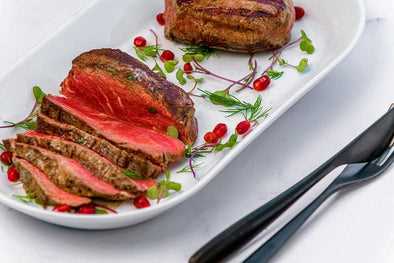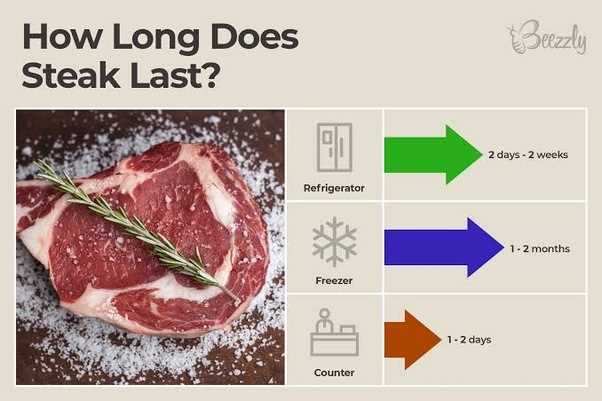Leaving cooked steak out overnight can be dangerous and increase the risk of foodborne illnesses. Bacteria can grow rapidly at temperatures between 40°F (4°C) and 140°F (60°C).
When cooked steak is left out at room temperature overnight, it can reach and stay within this danger zone for several hours, providing an ideal environment for bacteria growth. This can lead to food poisoning if consumed.
While some bacteria may be killed when cooking steak, certain types of bacteria, such as Staphylococcus aureus and Salmonella, can produce toxins that are resistant to heat and can cause illness even in small quantities.
It is recommended to refrigerate or freeze cooked steak within 2 hours of cooking to prevent bacterial growth and reduce the risk of foodborne illnesses. If cooked steak has been left out overnight, it is best to discard it to avoid the potential health risks.
Is it safe?
Leaving cooked steak out overnight can pose a serious health risk. Bacteria can multiply rapidly at room temperature, and if left out for too long, the steak can become contaminated and unsafe to eat.
When cooked steak is left out overnight, it enters what is known as the “temperature danger zone,” which is between 40°F (4°C) and 140°F (60°C). This is the temperature range in which bacteria quickly multiply and flourish.
Risks of consuming cooked steak left out overnight:
| Bacteria growth | Leaving cooked steak out for an extended period allows bacteria like Salmonella, E. coli, and Staphylococcus aureus to grow, increasing the risk of food poisoning. |
|---|---|
| Toxins production | Bacteria can also produce toxins, such as botulism, which can cause severe illness even in small quantities. |
| Quality deterioration | Leaving cooked steak out overnight can also lead to a loss in quality, resulting in a less enjoyable eating experience. |
To ensure food safety, it is recommended to refrigerate cooked steak within 2 hours of cooking. If the steak has been left out overnight, it is best to discard it to avoid any potential health risks. Always prioritize your health and safety when it comes to consuming perishable foods.
Understanding the risks of eating cooked steak left out overnight

Introduction
Leaving cooked steak out overnight poses potential health risks due to the growth of harmful bacteria. This article will discuss these risks and provide guidance on how to safely handle and store cooked steak.
Bacterial Growth
Steak contains protein-rich meat, which is an ideal environment for bacteria to grow. When cooked steak is left at room temperature for too long, bacteria such as Staphylococcus aureus and E. coli can multiply rapidly, causing food poisoning if consumed.
Food Poisoning
Eating cooked steak that has been left out overnight can result in food poisoning symptoms, such as nausea, vomiting, diarrhea, and abdominal pain. In severe cases, it can lead to dehydration and hospitalization.
Preventing Foodborne Illness
To prevent foodborne illnesses associated with eating cooked steak, it is important to follow proper food safety practices:
1. Temperature control: Cooked steak should be refrigerated within two hours of being cooked. Store it at a temperature below 40°F (4°C) to slow down bacterial growth.
2. Time limits: Never leave cooked steak at room temperature for more than two hours.
3. Proper reheating: When reheating cooked steak, ensure it reaches an internal temperature of 165°F (74°C) to kill any bacteria that may have grown.
4. Inspect the steak: If cooked steak has an off smell, unusual appearance, or sliminess, discard it immediately to avoid potential risks.
Conclusion
Eating cooked steak that has been left out overnight can be risky due to the potential growth of harmful bacteria. To ensure food safety, it is recommended to refrigerate cooked steak promptly and follow proper temperature control and reheating guidelines.
Potential dangers
Leaving cooked steak out overnight can increase the risk of bacterial growth, which can lead to food poisoning. Bacteria such as E. coli, Salmonella, and Staphylococcus aureus can multiply rapidly at room temperature, potentially producing toxins that can cause severe illness.
When steak is not promptly refrigerated after cooking, it provides an ideal environment for bacteria growth. The longer the steak is left out, the greater the risk of contamination. Consuming steak that has been left out overnight can result in symptoms like nausea, vomiting, abdominal pain, and diarrhea.
It is important to note that reheating the steak to a high temperature may kill some of the bacteria, but it does not eliminate the toxins they may have produced. Therefore, even if the steak is reheated, it may still be unsafe to consume.
Preventing bacterial growth
To reduce the risk of foodborne illness, it is crucial to follow proper food safety practices. Here are some tips to prevent bacterial growth:
- Store cooked steak in the refrigerator within two hours of cooking.
- Divide large portions of steak into smaller containers to cool them more quickly.
- Reheat cooked steak to an internal temperature of 75°C (165°F) to kill any remaining bacteria.
- Do not leave cooked steak out at room temperature for more than two hours.
- Wash hands thoroughly with soap and water before and after handling steak and other raw or cooked foods.
When in doubt, throw it out
If you are unsure whether cooked steak left out overnight is still safe to eat, it is best to err on the side of caution and discard it. It is better to waste food than to risk foodborne illness.
Remember to always prioritize food safety and proper handling to minimize the risk of food poisoning and protect your health.
| Bacterial growth risks | Symptoms of food poisoning |
|---|---|
| E. coli | Nausea, vomiting, abdominal pain, diarrhea |
| Salmonella | Nausea, vomiting, abdominal pain, diarrhea |
| Staphylococcus aureus | Nausea, vomiting, abdominal pain, diarrhea |
Bacteria growth and foodborne illnesses
Leaving cooked steak out overnight can result in bacterial growth and increase the risk of foodborne illnesses. Bacterial growth occurs when food is left at room temperature for an extended period, providing a favorable environment for microorganisms to multiply.
Certain bacteria, such as Staphylococcus aureus, Salmonella, and E. coli, can grow rapidly at temperatures between 40°F and 140°F (4°C and 60°C). These bacteria can cause food poisoning and various foodborne illnesses if consumed.
When cooked steak is left out overnight, it reaches the temperature danger zone (between 40°F and 140°F) and provides an ideal breeding ground for bacteria. As bacteria multiply, they release toxins that can cause illness, such as vomiting, diarrhea, abdominal pain, and fever.
It’s important to note that not all bacteria produce noticeable changes in taste, smell, or appearance of the food. This means that even if the steak looks and smells normal, it may still be contaminated with harmful bacteria.
Preventing bacterial growth and foodborne illnesses
- Refrigerate perishable foods within two hours of cooking or serving.
- Avoid leaving cooked food out at room temperature for more than two hours.
- Store leftovers in airtight containers in the refrigerator and consume within three to four days.
- When in doubt about the safety of leftover food, it’s better to throw it away to prevent foodborne illnesses.
- Ensure proper cooking temperatures, especially for meat products, to eliminate harmful bacteria.
- Regularly clean and sanitize food-preparation surfaces and utensils to reduce the risk of cross-contamination.
- Wash hands thoroughly before and after handling food to prevent the spread of bacteria.
Conclusion
Consuming cooked steak left out overnight can put you at risk of foodborne illnesses due to bacterial growth. To ensure food safety, it’s important to adhere to proper food storage and handling practices and avoid leaving cooked food at room temperature for extended periods.
Food safety guidelines
When it comes to food safety, it is important to follow certain guidelines to ensure that the food we consume does not pose a risk to our health. Here are some essential food safety guidelines to keep in mind:
Proper storage
Proper storage of food is crucial in preventing the growth of harmful bacteria. It is important to store raw meat, poultry, and seafood in the refrigerator at or below 40°F (4°C) to slow down bacterial growth. Cooked food should also be stored properly in airtight containers to prevent contamination.
Cooking temperatures

Cooking food at the right temperature is essential in killing harmful bacteria that may be present. Different types of food require different internal temperatures to be considered safe to eat. For instance, beef, lamb, and veal should be cooked to a minimum internal temperature of 145°F (63°C), while poultry should be cooked to an internal temperature of 165°F (74°C).
Furthermore, using a food thermometer to accurately measure the internal temperature of cooked food is highly recommended to ensure that it has reached a safe temperature.
Food handling
Proper food handling practices are crucial in preventing cross-contamination and the spread of bacteria. Wash hands thoroughly before and after handling food, especially raw meat, poultry, and seafood. Additionally, use separate cutting boards and utensils for different types of food to avoid cross-contamination.
Moreover, it is important to avoid leaving perishable food, such as cooked steak, out at room temperature for more than two hours. Bacteria can grow rapidly at temperatures between 40°F (4°C) and 140°F (60°C), so it is best to refrigerate or discard any food left out in this temperature range for an extended period of time.
By following these food safety guidelines, you can reduce the risk of foodborne illnesses and enjoy your meals with peace of mind.
Questions and answers
Is it safe to eat steak that was left out overnight?
No, it is not safe to eat steak that has been left out overnight. Bacteria can grow rapidly at room temperature, and consuming such steak can increase the risk of foodborne illnesses.
What happens if I eat steak that was left out overnight?
If you eat steak that has been left out overnight, you risk getting food poisoning. The bacteria that cause foodborne illnesses can multiply quickly at room temperature, and consuming the steak can lead to symptoms such as nausea, vomiting, diarrhea, and abdominal pain.
How long can cooked steak be left out before it becomes unsafe to eat?
It is generally recommended to refrigerate cooked steak within two hours of being cooked. Leaving it out for longer than that increases the risk of bacterial growth and foodborne illnesses. Therefore, ideally, cooked steak should not be left out for more than two hours.
Can I reheat steak that was left out overnight?
No, it is not recommended to reheat steak that was left out overnight. Even reheating will not kill all the bacteria that may have grown on the steak. It is best to discard any cooked steak that has been left at room temperature for an extended period of time.
How can I prevent food poisoning from eating steak left out overnight?
The best way to prevent food poisoning is to refrigerate cooked steak within two hours of being cooked. If you accidentally leave it out overnight, it is safest to discard it. It is also important to practice good food hygiene, such as washing hands thoroughly before and after handling raw meat, and cooking meat to the right internal temperature to kill any bacteria present.
Is it safe to eat cooked steak that has been left out overnight?
No, it is not safe to eat cooked steak that has been left out overnight. Bacteria can grow rapidly at room temperature, and the steak may become contaminated and lead to food poisoning.






